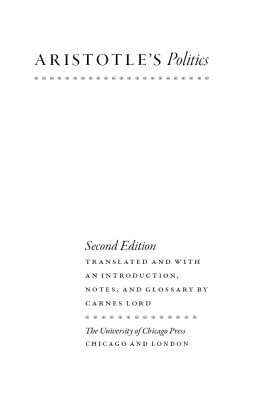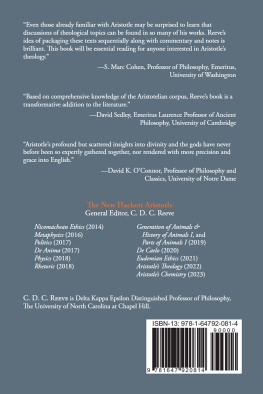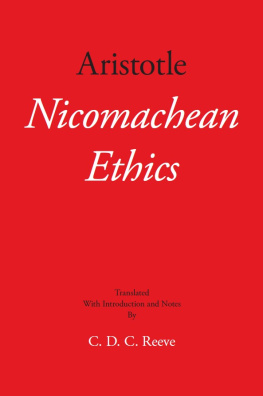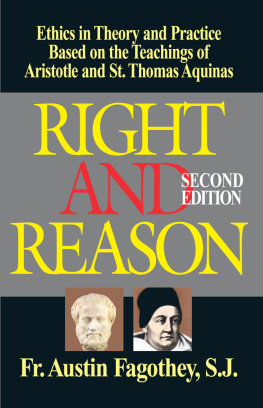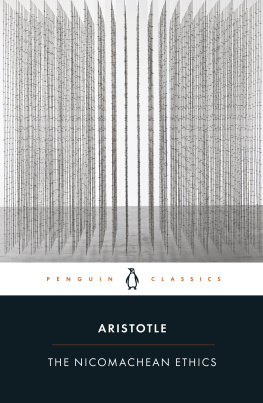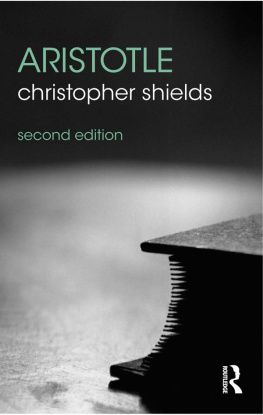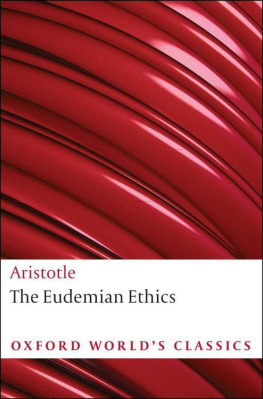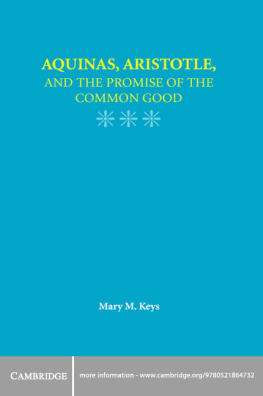Aristotle - Ethics
Here you can read online Aristotle - Ethics full text of the book (entire story) in english for free. Download pdf and epub, get meaning, cover and reviews about this ebook. genre: Science. Description of the work, (preface) as well as reviews are available. Best literature library LitArk.com created for fans of good reading and offers a wide selection of genres:
Romance novel
Science fiction
Adventure
Detective
Science
History
Home and family
Prose
Art
Politics
Computer
Non-fiction
Religion
Business
Children
Humor
Choose a favorite category and find really read worthwhile books. Enjoy immersion in the world of imagination, feel the emotions of the characters or learn something new for yourself, make an fascinating discovery.
Ethics: summary, description and annotation
We offer to read an annotation, description, summary or preface (depends on what the author of the book "Ethics" wrote himself). If you haven't found the necessary information about the book — write in the comments, we will try to find it.
Ethics — read online for free the complete book (whole text) full work
Below is the text of the book, divided by pages. System saving the place of the last page read, allows you to conveniently read the book "Ethics" online for free, without having to search again every time where you left off. Put a bookmark, and you can go to the page where you finished reading at any time.
Font size:
Interval:
Bookmark:
The Project Gutenberg EBook of Ethics, by Aristotle#5 in our series by Aristotle
Copyright laws are changing all over the world. Be sure to check thecopyright laws for your country before downloading or redistributingthis or any other Project Gutenberg eBook.
This header should be the first thing seen when viewing this ProjectGutenberg file. Please do not remove it. Do not change or edit theheader without written permission.
Please read the "legal small print," and other information about theeBook and Project Gutenberg at the bottom of this file. Included isimportant information about your specific rights and restrictions inhow the file may be used. You can also find out about how to make adonation to Project Gutenberg, and how to get involved.
**Welcome To The World of Free Plain Vanilla Electronic Texts**
**eBooks Readable By Both Humans and By Computers, Since 1971**
*****These eBooks Were Prepared By Thousands of Volunteers!*****
Title: Ethics
Author: Aristotle
Release Date: July, 2005 [EBook #8438][Yes, we are more than one year ahead of schedule][This file was first posted on July 10, 2003]
Edition: 10
Language: English
*** START OF THE PROJECT GUTENBERG EBOOK ETHICS ***
Produced by Ted Garvin, David Widger and the DP Team
The Ethics of Aristotle is one half of a single treatise of which hisPolitics is the other half. Both deal with one and the same subject.This subject is what Aristotle calls in one place the "philosophy ofhuman affairs;" but more frequently Political or Social Science. In thetwo works taken together we have their author's whole theory of humanconduct or practical activity, that is, of all human activity whichis not directed merely to knowledge or truth. The two parts of thistreatise are mutually complementary, but in a literary sense eachis independent and self-contained. The proem to the Ethics is anintroduction to the whole subject, not merely to the first part; thelast chapter of the Ethics points forward to the Politics, andsketches for that part of the treatise the order of enquiry to bepursued (an order which in the actual treatise is not adhered to).
The principle of distribution of the subject-matter between the twoworks is far from obvious, and has been much debated. Not much can begathered from their titles, which in any case were not given to them bytheir author. Nor do these titles suggest any very compact unity in theworks to which they are applied: the plural forms, which survive sooddly in English (Ethic_s_, Politic_s_), were intended to indicate thetreatment within a single work of a group of connected questions. Theunity of the first group arises from their centring round the topic ofcharacter, that of the second from their connection with the existenceand life of the city or state. We have thus to regard the Ethics asdealing with one group of problems and the Politics with a second,both falling within the wide compass of Political Science. Each of thesegroups falls into sub-groups which roughly correspond to the severalbooks in each work. The tendency to take up one by one the variousproblems which had suggested themselves in the wide field obscures boththe unity of the subject-matter and its proper articulation. But it isto be remembered that what is offered us is avowedly rather an enquirythan an exposition of hard and fast doctrine.
Nevertheless each work aims at a relative completeness, and it isimportant to observe the relation of each to the other. The distinctionis not that the one treats of Moral and the other of PoliticalPhilosophy, nor again that the one deals with the moral activity of theindividual and the other with that of the State, nor once more that theone gives us the theory of human conduct, while the other discusses itsapplication in practice, though not all of these misinterpretations areequally erroneous. The clue to the right interpretation is given byAristotle himself, where in the last chapter of the Ethics he ispaving the way for the Politics. In the Ethics he has not confinedhimself to the abstract or isolated individual, but has always thoughtof him, or we might say, in his social and political context, with agiven nature due to race and heredity and in certain surroundings.So viewing him he has studied the nature and formation of hischaracterall that he can make himself or be made by others to be.Especially he has investigated the various admirable forms of humancharacter and the mode of their production. But all this, though itbrings more clearly before us what goodness or virtue is, and how it isto be reached, remains mere theory or talk. By itself it does notenable us to become, or to help others to become, good. For this it isnecessary to bring into play the great force of the Political Communityor State, of which the main instrument is Law. Hence arises the demandfor the necessary complement to the Ethics, i.e., a treatise devotedto the questions which centre round the enquiry; by what organisationof social or political forces, by what laws or institutions can we bestsecure the greatest amount of good character?
We must, however, remember that the production of good character is notthe end of either individual or state action: that is the aim of the oneand the other because good character is the indispensable condition andchief determinant of happiness, itself the goal of all human doing. Theend of all action, individual or collective, is the greatest happinessof the greatest number. There is, Aristotle insists, no difference ofkind between the good of one and the good of many or all. The soledifference is one of amount or scale. This does not mean simply that theState exists to secure in larger measure the objects of degree which theisolated individual attempts, but is too feeble, to secure without it.On the contrary, it rather insists that whatever goods society aloneenables a man to secure have always had to the individualwhether herealised it or notthe value which, when so secured, he recognises themto possess. The best and happiest life for the individual is that whichthe State renders possible, and this it does mainly by revealing to himthe value of new objects of desire and educating him to appreciate them.To Aristotle or to Plato the State is, above all, a large and powerfuleducative agency which gives the individual increased opportunities ofself-development and greater capacities for the enjoyment of life.
Looking forward, then, to the life of the State as that which aidssupport, and combines the efforts of the individual to obtain happiness,Aristotle draws no hard and fast distinction between the spheres ofaction of Man as individual and Man as citizen. Nor does the division ofhis discussion into the Ethics and the Politics rest upon any suchdistinction. The distinction implied is rather between two stages in thelife of the civilised manthe stage of preparation for the full life ofthe adult citizen, and the stage of the actual exercise or enjoyment ofcitizenship. Hence the Ethics, where his attention is directed uponthe formation of character, is largely and centrally a treatise on MoralEducation. It discusses especially those admirable human qualities whichfit a man for life in an organised civic community, which makes him "agood citizen," and considers how they can be fostered or created andtheir opposites prevented.
This is the kernel of the Ethics, and all the rest is subordinate tothis main interest and purpose. Yet "the rest" is not irrelevant; thewhole situation in which character grows and operates is concretelyconceived. There is a basis of what we should call Psychology, sketchedin firm outlines, the deeper presuppositions and the wider issues ofhuman character and conduct are not ignored, and there is no little ofwhat we should call Metaphysics. But neither the Psychology nor theMetaphysics is elaborated, and only so much is brought forward asappears necessary to put the main facts in their proper perspectiveand setting. It is this combination of width of outlook with closeobservation of the concrete facts of conduct which gives its abidingvalue to the work, and justifies the view of it as containingAristotle's Moral Philosophy. Nor is it important merely as summing upthe moral judgments and speculations of an age now long past. It seizesand dwells upon those elements and features in human practice which aremost essential and permanent, and it is small wonder that so much in itsurvives in our own ways of regarding conduct and speaking of it. Thusit still remains one of the classics of Moral Philosophy, nor is itsvalue likely soon to be exhausted.
Next pageFont size:
Interval:
Bookmark:
Similar books «Ethics»
Look at similar books to Ethics. We have selected literature similar in name and meaning in the hope of providing readers with more options to find new, interesting, not yet read works.
Discussion, reviews of the book Ethics and just readers' own opinions. Leave your comments, write what you think about the work, its meaning or the main characters. Specify what exactly you liked and what you didn't like, and why you think so.



